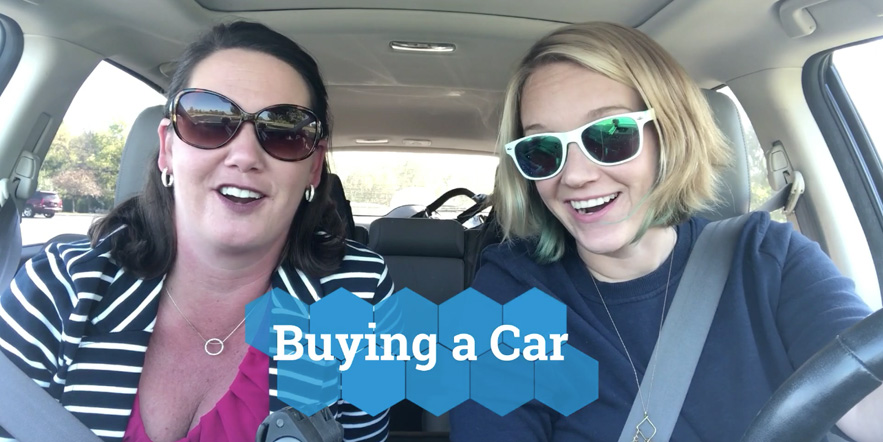Hello! Welcome to our new web series “CU Walk the Money Talk” where the credit union’s very own, Ashley Scroggins and Lori Hudson discuss personal finance topics that make it easier to digest (and yes fun!). We hope you enjoy our series and make sure to subscribe to get updates when new videos are posted. Enjoy!
Purchasing a new car, for the first time or the 10th, can be daunting. Besides a house, it’s probably the most you’re going to pay for any single item, it’s going to be with you for years and, depending on your commute, you might be spending hours with it every day. Get it right with Ashley and Lori’s help as they divulge 5 tips to help you on your way to the dealership (or ice cream).
Preparation
The key to any big purchase is preparation. It is important to consider the purpose of most of your driving. Is it commuting? Hauling kids? Weekends? Vacations? Take some time to think about how you plan to use this car. For example, if you have a family, you’ll want enough room for everyone plus ample cargo space. If safety is a top priority, check out the Insurance Institute for Highway Safety for crash tests. Narrow the field by making a list of must-have features. Then, search for models with those features using tools such as Car Finder on Edmunds.com. As you move forward, build a list of three target car models to research in more detail.
Set Your Budget
There are really only two ways for you to buy a car: Pay cash or take out a loan. If you’re paying cash, budgeting is pretty simple. But don’t spend all your savings. Remember to set aside money for registration and insurance — and possible future repairs. Most people take out a car loan so they can protect their savings and buy a more expensive model. It’s smart to get preapproved for a car loan because it simplifies the buying process and puts you in a stronger position at the car dealership. You’ll see later how preapproval fits into the process.
Use an auto loan calculator to compute the best loan for you. Plan to put about 10 percent down and finance the car for three years. Ideally, the total of your monthly auto expenses shouldn’t be more than 20% of your monthly take home pay.
Comparison Research
Even before stepping into a dealership, do your homework. The Internet has made it easier than ever to find out the dealer’s cost for each vehicle and its options. Set a target price and start comparing rates. If you plan to trade in your current vehicle, find out its value in the NADA Guides or Kelly Blue Book. Finding out how different vehicles were rated in different categories from sites like consumer reports. They will help you distinguish hype from fact.
Get Pre-Approved
If you’re one of the lucky ones who doesn’t need a loan, you can skip this step. Otherwise, it’s best to arrange for your loan before you go in. Doing so affords you the time to shop around for better terms, and lets you make a decision without a high-pressure salesman sitting across from you. If the dealer can make you a better offer, that’s great, but it’s best to have options. See Member Services about getting pre-approved.
Negotiate
When you bargain with a car salesperson at a car lot or dealership, keep in mind that you’re dealing with a pro who knows all the tricks. Here are a few tips to use on the car lot:
- Don’t be a monthly payment buyer. If you have a preapproved loan, you’re a cash buyer as far as the dealer is concerned and you should negotiate on the price of the car, not the size of the monthly payment. This allows you to dodge a common trap set for buyers by salesmen: convincing a buyer to focus on the monthly payment rather than the overall cost of the car.
- Start low, but in the ballpark. Lowball the seller and they won’t treat you as a serious buyer. Instead, make an offer that is on the low side, but still enticing. Then, improve your offer slowly, perhaps in increments of $250.
- Don’t be trapped in the sales office. Don’t let a salesman leave you alone while he “goes to talk with his boss.” Instead, roam around the showroom or go get a cup of coffee. Uncontrollable buyers keep salespeople off balance, which can help you in negotiations.
- Negotiate slowly and repeat the numbers you hear. It’s easy to get confused, so go slow or even write down the numbers thrown at you. Make sure you know if you’re talking about the “out-the-door” price, which includes all taxes and fees, or just the sale price of the car.
- Ask about fees before saying yes to a deal. Some dealers include bogus fees to take back profit they lose in negotiating. Ask for a breakdown of additional fees before you agree to any deal.
- Always be ready to walk. If you aren’t making progress toward a deal, or you don’t like the way you’re being treated, just walk out. No goodbyes are necessary.
Other money-saving services available through the credit union:
- Extended Warranty – Coverage helps you enjoy your new purchase and maintain peace of mind because even the most reliable vehicle can develop mechanical problems.
- Gap Insurance – Guaranteed Auto Protection (GAP) helps pay off your remaining loan balance if your vehicle is stolen or totaled in an accident, allowing you to start fresh with a new vehicle purchase. It is also inexpensive and can be rolled into your loan payments.
- Auto Insurance – With discounts for credit union members, the TruStage™ Auto Insurance Program could save you money. It’s easy to get a quote and make the switch- even if you are already covered with another company, you won’t lose a penny! Check out the value only available to credit union members!
When financing a car, you should be certain your lender
has your best interest in mind. West Community will work hard to offer you the
lowest rate possible and monthly payments that fit into your budget. Apply online or call Member Services at 636.720.2400 for more information and happy shopping!
Have you bought a car recently, or do you have any tips to share? Share them in the comments.




